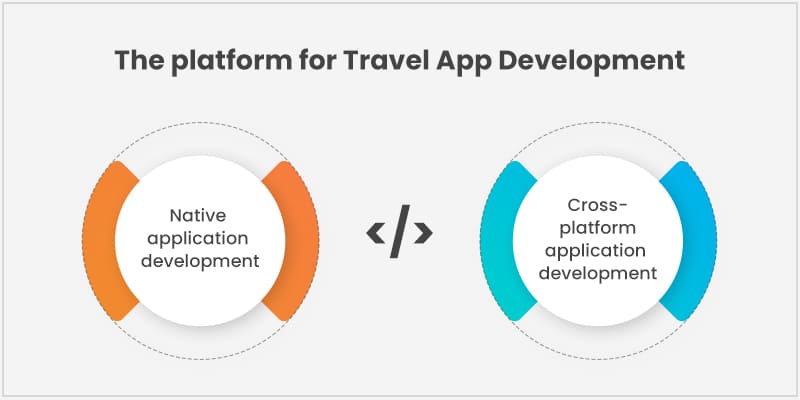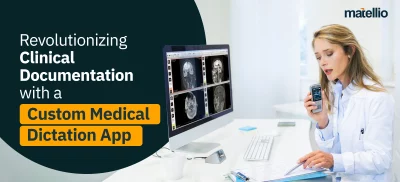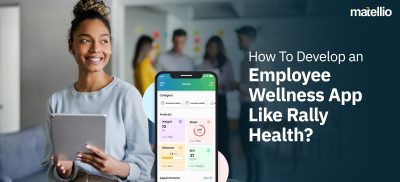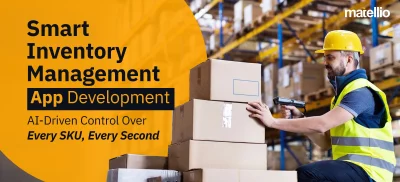
Traveling experiences and expectations have drastically changed over the past few decades. The market has become dynamic, and so have the user’s requirements. They no more plan long summer/ winter vacations and rather look for a quick weekend getaway to blow off some steam.
They don’t rely on strangers to explore a new destination but want all the information at their fingertips. And who is their best friend in this? Travel Applications.
While 17% of people in the United States have bought a travel app subscription to help them plan their travels, studies have found that they spend 29% more time on average booking a trip. Not only this, 29% of travelers prefer direct travel reservations for various reasons, including:

It is no wonder that travel app development is picking up and emerging as a top way for brands to achieve their sales target. If you are one of those, we have something that will help you. This blog covers the process of travel app development along with important highlights of what a travel app must have.
Let’s get started.
Step 1: Discovery and Scope Freezing with Business Technology Consulting
The first step of travel app development starts with our team of business consultants. They are technology experts who help you uncover requirements and make sure to add to their value. They analyze your added idea, study your market in-depth and outline the roadmap to its deliverables, known as scope freezing.
Once your business aspects are covered, we will help you work around the technical aspects. This includes:
The Platform for Travel App Development

Here is what you can choose from:
a. Native Application Development
Native apps are platform-specific for iOS and Android. The Native app development services is the preferred option if your target audience prefers one platform. Some of the benefits include:
- High performance
- Robust security
- Interactiveness and intuitiveness
- Accessibility to a full range of features
- Lesser bugs
b. Cross-platform Application Development
Cross-platform app development covers more than one platform with just a single codebase. They are compatible with both iOS and Android. You can choose this if your target audience has no specific platform preference. Some of the benefits include:
- Broader target audience
- Native-like experience
- Cost-effective
- Better cloud integration
- Quicker time-to-market
- Faster customization
- Design uniformity
- Direct access to plugins
Also Read: Cross-Platform App Development | Everything You Need to Know
Choosing Team for Travel App Development
Once you know the requirements clearly, you can finalize the team structure. Your team should ideally have the following professionals:
Once you know how to develop the travel app, you can finish the team:
Business consultants
- Project manager
- Native or cross-platform app developers
- UI/UX engineers
- Quality analysts
Being a trusted travel app development company, we follow well-proven client-centric agile methodology to ensure your team delivers up to your expectations. Our experts are certified and focus on delivering long-term value to our customers
Finalize the App Development Technology Stack
The technology stack is the basic building block of travel app development. Matellio’s team will be your partner in this journey and help you figure out the best technology stack according to your requirements. It would help to choose a technology stack that keeps you updated on the market trends and standards. Some of the known technology stacks and frameworks that we use for mobile app development include:
a. Native App Development:
- Swift (iOS development framework)
- Android Studio (Android development framework)
b. Cross-platform App Development:
- React Native (Cross-platform development framework)
- Ionic (Cross-platform development framework)
- Xamarin (Cross-platform development framework)
c. Data Analytics Tools
- Python
- Java
- Amazon EC2
- Amazon S3
- Kafka
- Scala
- Amazon VPC
- Amazon EMR
- Apache Impala
d. Utilities
- Elastic Search
e. DevOps Tools
- Chef
- AWS CloudFormation
f. Database
- Aerospike
- MongoDB
- Cassandra
- HBase
- MySQL
- Postgres
Step 2: Architecture to Consider During Travel App Development
After the discovery phase, we finalize the architecture of the travel app. It offers a set of patterns and techniques for travel app development, keeping the app owner’s requirements and industry standards in mind.
An excellent travel app architecture ensures that all the app components work seamlessly and helps shorten the turnaround time.
There are three levels to mobile architecture:
- Presentation Layer
- Business Layer
- Data Access Layer
Step 3: UI/ UX Development
Travel app experiences closely impact the travel experience. You can ensure seamless expertise to guarantee that your users keep coming back to you. With attention span decreasing, you have only 6 seconds to deliver that experience.
To make sure your enterprise mobility solutions creates the right user experience, travel app development teams at Matellio focus on the following aspects::
a. Transparency: Ensure the app doesn’t have the surprise element by incurring unnecessary costs. Communicate the value required.
b. Minimalism: Users are highly demanding, and the market requirements are dynamic. You have limited space to deliver the information, make sure to use it wisely. Travelers don’t need any unnecessary information. We follow a minimalistic design approach that provides the right value without reducing the amount of important information.
c. Easy Navigations: Focus on making the app as intuitive as possible. To ensure this, we take the aspects such as:
- It should be easier to find results if users search for anything
- The search bar should be visible, faster, and easier to access
- Personalize the search results to help users
- Present data appealingly and not in a cluttered way
d. Speed and Agility: Travelers are on your app for specific reasons. No one loves a travel app that increases their problems than reduces them. We focus on ensuring the results are rendered faster.
Step 4: Travel App Development: Functionality Perspective
Travel app development is done according to the agile process while considering the requirements of each user category is taken into account. The entire travel app development process covers three main stages:
Phase 1: Travel App Development for Travelers
- User Sign up/ Login: Simple user sign-up and login options.
- Avail Deals: Users can explore the deals and discount options and get information about them. Users can check for the available holiday packages and book them.
- Holiday Package: Users can browse through the available holiday packages on the app and book them.
- Find or Book Cabs: This helps the users to find the caps in the new locations and navigate around easily.
- Discover Vendors: This feature will enable users to discover local vendors for specific items and gain more knowledge about local culture.
- In-app Payment: Integrated and secure payment options help hassle-free payments, regardless of the travel destination’s currency or required payment guidelines.
- GPS Integration: It helps travelers navigate across the destination easily.
- Bookmark or Shortlist: Users can shortlist the destinations or vendors they like.
- Search: Users can perform a search for the required things quickly.
- Travel Guide: Users can point to the location and have a step-by-step travel guide at their fingertips.
- Reviews: Users can share feedback about the vendors and other facilities they access.
- Categories: Travelers can easily use destinations as categories, and the app will help them find nearby sites quickly based on various types.
- Categories: You can use country states/cities as categories, and the app will divide the contents according to the types.
- Multi-language Support: It lets users view the content based on their preferred language.
Phase 2: Travel App Development for Businesses
- Package Management: Vendors can make and modify packages based on their strategies.
- Listed Destinations: Businesses can list or delist the locations from their clients’ geographies.
- Payments: Vendors can receive the charges or request payment via the app.
- Manage Bookings: Vendors can check the booking for hotels, flights, etc., and send the confirmation.
- Edit Packages: Agencies can edit the packages and make changes to prices, offerings, deals, etc.
- Analytics: Vendors can review reports generated based on bookings made for services to make informed decisions about strategies.
Phase 3: Admin Panel Development
- Manage Requests: Admins can check all the requests made on the system and take relevant actions.
- Manage Users: Admins can manage user categories and users.
- Dashboard: Real-time insights about the users, places, blogs, featured content, etc.
- Upload, Edit, Delete: Control various aspects of the application with real-time preview options.
- Manage Ads and Promotions: Admins can create and get a detailed view of existing ads and promotional offers and their performance.
Step 5: Quality Assurance and Launch
This is one of the crucial aspects of travel app development. Travel apps don’t cater to a specific group or people of a similar age group. The app must ensure that it caters to the requirements of a global audience and has provisions for multiple currencies, time and date formats, languages, preferences, and more. Quality assurance takes care of all these aspects and ensures all features function just like they should.
Testing Types for Travel Apps Followed at Matellio
a. Connectivity Testing
As more travelers prefer booking from travel applications, businesses are increasingly investing in the arena. You must create experiences for varied devices and networks to grab users’ eyeballs.
b. Accessibility Testing
Accessibility testing ensures that your launch travel app is seamlessly operational across multiple access points.
c. Globalization Testing
Globalization testing tests app validity against the requirement of the global audience. It helps you ensure your travel app can meet the target audience’s geographic, cultural, and demographic needs.
Are You Ready to Invest in Travel App Development?
Matellio is here to help. Research has proven that the travel sector recovered over 50% of its gross revenue in 2021 compared to the pre-coronavirus numbers. This recovery is projected to reach 85% by the end of 2022.
Make the most of this trend by making a wise investment in the travel app development services of Matellio. Our team is certified in advanced technologies and offers travel app experiences that help you build your brand. As a travel app development company in USA with a global presence, we enable cutting-edge product development with:
- Custom Travel Software Development
- AI-enabled Travel and Hospitality Software
- Blockchain-Enabled Travel and Hospitality Solutions
- IoT-based Travel and Hospitality Software
- Big Data Travel and Hospitality Solutions
Let’s assist you on a FREE 30-minute consultation call to start immediately.





